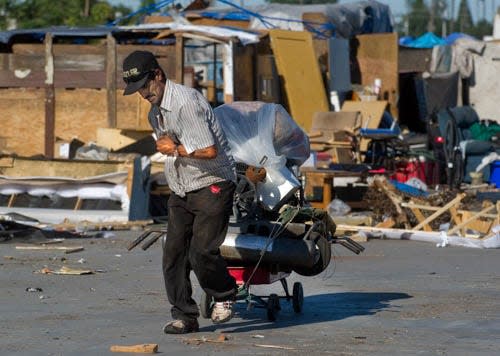San Francisco was ordered to stop homeless camp sweeps. Is Stockton next?

For eight months, San Francisco officials have been banned by court order from clearing homeless encampments from the city’s streets.
Could encampment sweeps in Stockton — and other cities across the U.S. — soon be banned, too?
A lightning-rod lawsuit, which returned to court this month, against the city of San Francisco could set that precedent, Zal Shroff — acting director of a Bay Area civil rights group and a lead attorney — said.
The argument goes: homeless residents outnumber open shelter beds by the thousands in San Francisco. So encampment clearing operations — which often displace and destroy homeless residents’ only belongings — effectively punish them for having nowhere else to go.
“It’s cruel and unusual, not to mention misguided,” Shroff said.
The lawsuit aims “to create an obvious message,” he added. “And sort of a symbol … to cue other jurisdictions in that they need to comply with the Constitution.”
A judge ordered San Francisco to halt most encampment sweeps in December.
The case has stoked anger: protests at the courthouse were attended by San Francisco Mayor London Breed, who opposes the injunction, The Chronicle reported. In comments to the newspaper on Tuesday, Gov. Gavin Newsom called the ban on sweeps “preposterous” and “inhumane.”
Cities across California and the country — including Stockton — appear vulnerable to the same legal argument San Francisco is now staring down.
At last year’s count, there were 893 unsheltered people in Stockton, a number some experts say is about three times lower than the real number. And while the number of open shelter beds fluctuates daily, it’s unlikely to have ever come close to matching the number of people counted on the streets, said Jerry Ruiz, CEO of Stockton Shelter for the Homeless.
Shelter beds at the Stockton Shelter, Haven of Peace — a women’s shelter based in French Camp — and the Gospel Center Rescue Mission were all full on Friday.
A new 180-bed Navigation Center originally set to open this summer has been delayed. A St. Mary’s Dining Room promising 326 beds is set to open late next year.
But until there are enough beds for every unsheltered person, Stockton’s homeless sweeps could, in theory, face the same legal challenge as San Francisco’s — especially if the city loses its current court battle.
And yet, a change to Stockton's city code last fall may give officials some cover from a potential challenge, according to Stockton's city attorney, Lori Asuncion.
The amendment broadly defines certain areas in Stockton as “critical infrastructure” — including roads, sidewalks, parks, sloughs, levees, bridges, train tracks, and anywhere else the city manager decides would be disrupted by homeless encampments to the detriment of the public.
Camping in or around them is deemed a misdemeanor, though typically officials don't bring charges.
The “critical infrastructure” label may shift the balance of potential legal arguments against encampment sweeps in those areas, according to Asuncion.
It could allow city officials to weigh unhoused people’s right not to be punished for the shelter shortage against “the right to protect this infrastructure on behalf of the citizenry,” she said.
Record reporter Aaron Leathley covers public safety. She can be reached at aleathley@recordnet.com or on Twitter @LeathleyAaron. Support local news, subscribe to The Stockton Record at https://www.recordnet.com/subscribenow.
This article originally appeared on The Record: San Francisco was ordered to stop homeless camp sweeps. Is Stockton next?
